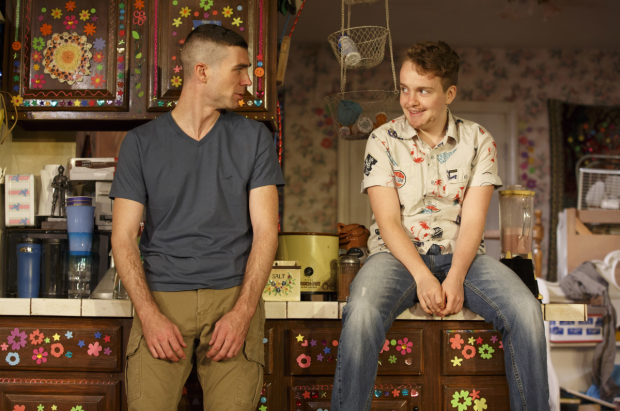Hir

(© Joan Marcus)
The first image of Taylor Mac's Hir at Playwrights Horizons is a disturbing one. The curtains part on a 1950s-style living room, filled floor to ceiling with garbage and soiled clothes. In front of it all is a grown man in a violet nightgown, his face in kabuki makeup, his head covered by a clown's multicolored wig. It's a jolt, all right — one that tells us things aren't so ordinary in the unsettling sphere Mac is about to create.
A remarkable examination of gender and identity in contemporary America, Hir is written in a style that Mac calls "absurd realism." Part kitchen-sink drama, part over-the-top vaudeville sketch, Hir lives somewhere between actual reality and The Twilight Zone, in a home where the oppressed have suddenly become the ruling class. The man in the clown costume is Arnold (Daniel Oreskes), a tyrannical patriarch whose history of abuse lingers in the minds of his wife and children. But that was years ago. Arnold is now a stroke victim who can barely put together a sentence. His wife, Paige (Tony nominee Kristine Nielsen), has the run of the house, seizing the opportunity to treat him the way he treated her for so long.
As the play begins, their son Isaac (Cameron Scoggins) has returned home under uncertain circumstances after three tours of duty with the marines. A gut-and-limb collector in the Middle East, "I," as he is called, is unable to fathom what his family has become. He can't seem to comprehend out why Paige dresses Arnold in fright makeup and makes him sleep in a box on the floor. But the most shocking business is still to come. Isaac's sister, Maxine, is no longer his sister. Max (Tom Phelan) is in the midst of a gender transformation, using the third-sex pronouns "Ze" and "Hir" instead of "he," "she," "him," or "her." Ze and Paige are creating a new way of life for themselves, one that isn't reliant on straight white men. But what happens to Isaac when there's literally no room for him anymore?
Hir is one of the most dangerous and ambitious works presented by a mainstream nonprofit in quite some time. Over the course of 110 minutes, Mac (who uses the self-created gender pronoun "judy"), creates an allegory about the way soldiers are treated when they return to the United States, explores the damage caused by PTSD, and tells a coming-of-age tale involving a genderqueer kid trying to valiantly remake an origin story and find a place in the world. With as many ingredients as goulash, and a tone that shifts quickly from low comedy to high drama, logically Hir shouldn't coalesce nearly as well as it does. Mac goes for the jugular with an unrelenting grip to paint a portrait of a universe where traditional values are worthless and those who can't adapt swiftly to the new ones are better off dead.
Director Niegel Smith's production is intense and thoughtful, with a four-member cast that is collectively excellent. Phelan and Scoggins are completely believable as siblings, the former marvelous as a teenager who just wants to figure out what to do with a life that suddenly has new meaning, while the latter paints an astounding portrait of a psychologically damaged manly man who doesn't know how to be anything but.
As the addled father who totters around the house like a baby learning to take his first steps, Oreskes offers a performance that is equal parts heartbreaking and chilling. Best of all is Nielsen, who is as gleefully insane as ever, yet with hints of extreme darkness simmering beneath the surface. It builds to a head in the second half, where her delicious eccentricity explodes, without warning, into a terrifying pool of wounding rage and resentment. It is perhaps her greatest performance to date, and that includes her multifaceted work in Vanya and Sonia and Masha and Spike.
Smith's design team is just as pitch perfect as the company. David Zinn's living room set, a hoarder's paradise, will leave those of us with an aversion to clutter hugging our knees (it's so realistic we practically can smell the stink). Gabriel Berry provides well-worn costumes while Mike Inwood's lighting subtly shifts in brightness and dimness as the single day in which Hir takes place drags on.
Hir isn't perfect (the speed of the who's-on-first-style word-and-action repetition is oftentimes wearying), but the play is sharp, shocking, and really, really funny while also vividly explorative of the depth of human emotions. Mac has crafted a piece that, much like judy's characters, defies labels and categorization. Hir is an audacious, important work that won't be easily forgotten.










